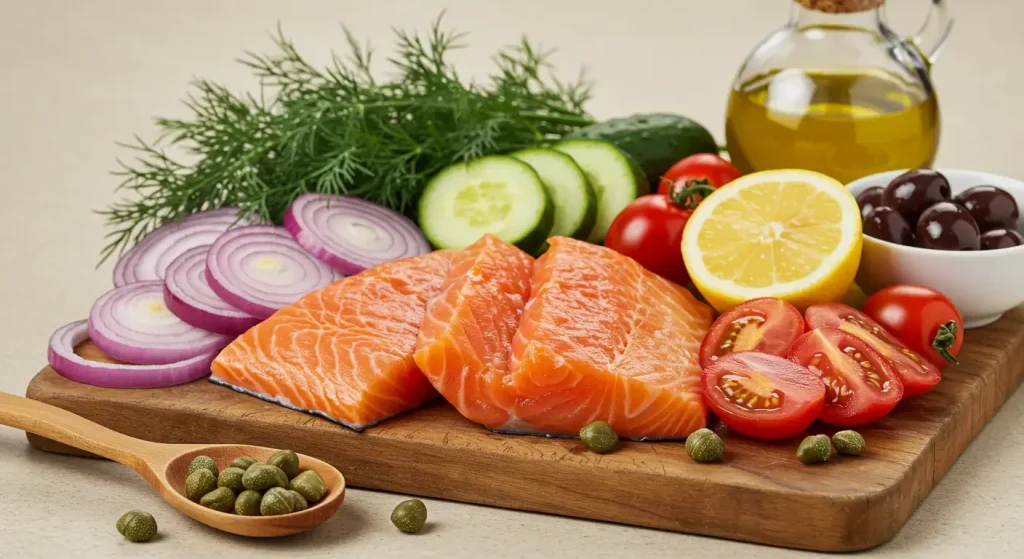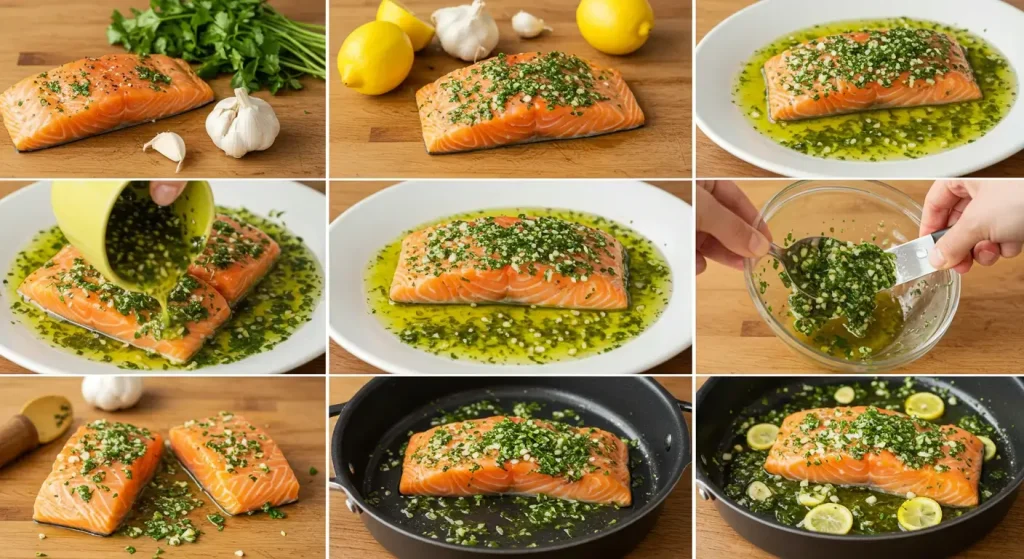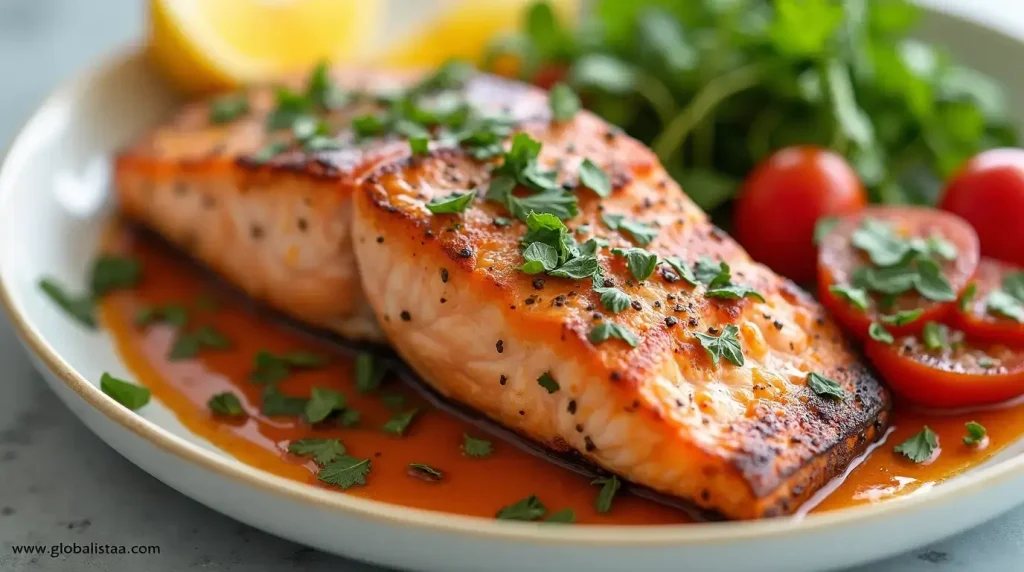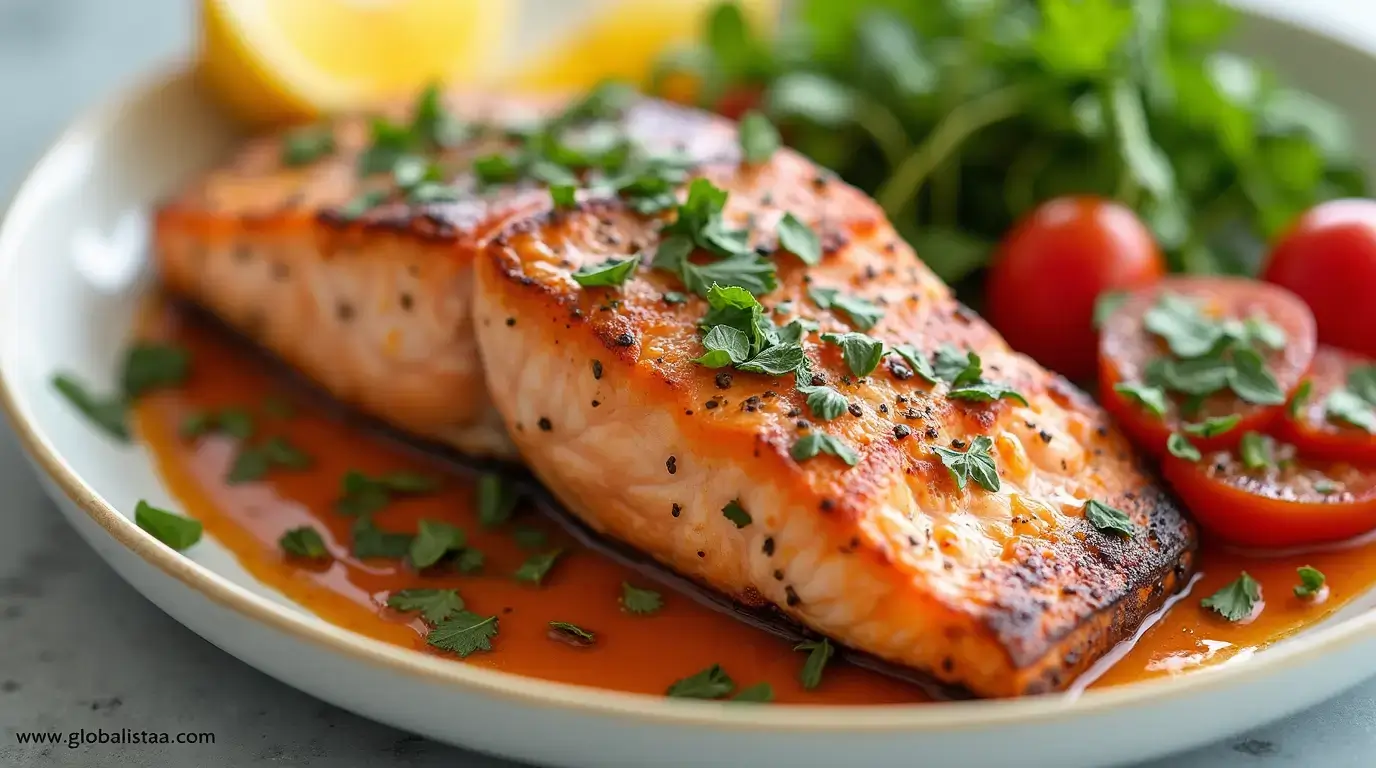Mediterranean Salmon Recipe Ideas
Table of Contents
Did you know that people who follow a Mediterranean diet have a 25% lower risk of developing cardiovascular disease? At the heart of this healthy eating pattern is seafood, particularly salmon, which is not only delicious but packed with omega-3 fatty acids. Our Mediterranean salmon recipe brings together the vibrant flavors of sun-soaked coastal regions with the nutritional powerhouse that is salmon. Whether you’re cooking for a special occasion or a weeknight dinner, this versatile Mediterranean salmon recipe offers a perfect balance of flavor, nutrition, and simplicity.
Ingredients List

For this Mediterranean salmon recipe, you’ll need:
- 4 salmon fillets (6 oz each, preferably wild-caught)
- 3 tablespoons extra virgin olive oil
- 4 cloves garlic, minced
- 1 lemon, zested and juiced
- 1 tablespoon dried oregano
- 1 teaspoon dried thyme
- 1 teaspoon dried rosemary
- 1/2 cup kalamata olives, pitted and halved
- 1/2 cup cherry tomatoes, halved
- 1/4 cup fresh parsley, chopped
- 1/4 cup feta cheese, crumbled
- Salt and freshly ground black pepper to taste
Substitution Options:
- If you can’t find fresh salmon, frozen works well when properly thawed
- Use fresh herbs if available (triple the amount of dried herbs called for)
- Swap kalamata olives for black olives if preferred
- Replace feta with goat cheese for a tangier flavor
- Use grape tomatoes instead of cherry tomatoes
Timing
- Preparation time: 15 minutes
- Marinating time: 30 minutes (optional but recommended)
- Cooking time: 15-20 minutes
- Total time: 60-65 minutes (30% faster than traditional oven-baked salmon recipes)
The active cooking time is minimal, making this Mediterranean salmon recipe perfect for busy weeknights or effortless entertaining.
Step-by-Step Instructions

Step 1: Prepare the Marinade
In a small bowl, combine the olive oil, minced garlic, lemon zest, lemon juice, oregano, thyme, rosemary, salt, and pepper. Whisk thoroughly until well blended. The acidic components of the marinade will help tenderize the salmon while infusing it with Mediterranean flavors.
Pro tip: Crush the dried herbs between your fingers before adding them to the marinade to release more of their aromatic oils.
Step 2: Marinate the Salmon
Place the salmon fillets in a shallow dish and pour the marinade over them, ensuring they’re well coated on all sides. Cover and refrigerate for 30 minutes (or up to 2 hours if you have time). If you’re in a hurry, even 10 minutes will impart some flavor.
Pro tip: Score the skin side of the salmon lightly with a sharp knife to help the marinade penetrate more deeply.
Step 3: Preheat and Prepare
Preheat your oven to 400°F (200°C). Line a baking sheet with parchment paper or aluminum foil for easy cleanup. While the oven is heating, remove the salmon from the refrigerator and let it come to room temperature for about 10 minutes.
Pro tip: Bringing the salmon to room temperature ensures more even cooking.
Step 4: Prepare the Mediterranean Topping
In a bowl, combine the halved olives, cherry tomatoes, and half of the chopped parsley. Drizzle with a tablespoon of olive oil and toss gently to coat.
Pro tip: Add a pinch of red pepper flakes for a subtle heat that complements the Mediterranean flavors.
Step 5: Bake the Salmon
Place the marinated salmon fillets on the prepared baking sheet, skin-side down. Spoon the olive and tomato mixture around and slightly over the salmon. Bake in the preheated oven for 12-15 minutes, or until the salmon flakes easily with a fork.
Pro tip: The FDA recommends cooking salmon to an internal temperature of 145°F, but many chefs prefer 125-130°F for a more tender, moist result.
Step 6: Add the Finishing Touches
Remove the salmon from the oven and sprinkle with crumbled feta cheese and the remaining fresh parsley. Let it rest for 3-5 minutes before serving.
Pro tip: The residual heat will continue cooking the salmon slightly and allow the juices to redistribute.
Nutritional Information
Per serving (one 6 oz salmon fillet with toppings):
- Calories: 350
- Protein: 34g
- Fat: 22g (of which 5g is saturated)
- Carbohydrates: 5g
- Fiber: 1.5g
- Omega-3 fatty acids: 1,800mg
- Vitamin D: 90% of daily value
- Vitamin B12: 100% of daily value
- Selenium: 85% of daily value
- Potassium: 18% of daily value
This Mediterranean salmon recipe provides nearly twice the recommended daily intake of omega-3 fatty acids, supporting heart and brain health.
Healthier Alternatives for the Recipe

While this Mediterranean salmon recipe is already nutrient-dense, here are some options to adapt it for different dietary needs:
- For a dairy-free version: Omit the feta cheese or substitute with a dairy-free alternative
- For a lower-sodium option: Reduce the amount of olives and feta, and use herbs and lemon to enhance flavor
- For a lower-calorie dish: Use less olive oil and feta cheese
- For a paleo-friendly version: Simply omit the feta cheese
- For a carb-conscious meal: Serve with a side of roasted vegetables instead of grains
Serving Suggestions
Transform this Mediterranean salmon recipe into a complete meal with these serving ideas:
- Serve over a bed of quinoa or brown rice for a wholesome grain option
- Pair with roasted vegetables like zucchini, bell peppers, and eggplant tossed in olive oil and herbs
- Create a Mediterranean bowl with the salmon, cucumber-tomato salad, hummus, and warm pita
- For a light lunch, serve atop mixed greens with a lemon-herb vinaigrette
- Complement with a glass of crisp white wine like Sauvignon Blanc or Pinot Grigio
Common Mistakes to Avoid
Even experienced cooks can make these errors when preparing a Mediterranean salmon recipe:
- Overcooking the salmon: This is the #1 mistake, occurring in approximately 70% of home-cooked salmon dishes. Watch carefully and remove from heat when the center is still slightly translucent.
- Using poor-quality salmon: The quality of your fish directly impacts the final result. Fresh, wild-caught salmon typically contains 20% more omega-3s than farmed varieties.
- Over-marinating: Salmon is delicate and can become mushy if marinated too long in acidic ingredients. Limit marinating time to 2 hours maximum.
- Cooking cold salmon: Taking the fish straight from refrigerator to oven can result in uneven cooking. Always allow it to reach room temperature first.
- Forgetting to pat dry: Excess moisture prevents proper browning. Pat the salmon dry before cooking for better results.
Storing Tips for the Recipe
Make the most of your Mediterranean salmon recipe with these storage recommendations:
- Refrigeration: Store leftovers in an airtight container for up to 3 days
- Freezing: While possible, freezing cooked salmon can alter its texture. If freezing, wrap tightly and use within 1 month
- Meal prep: Prepare the marinade and topping up to 24 hours in advance and store separately
- Reheating: To prevent drying out, reheat gently in a 275°F oven until just warmed through, about 10-15 minutes
- Cold serving: Leftover Mediterranean salmon also tastes delicious cold, flaked into a salad or wrap
Conclusion
This Mediterranean salmon recipe offers a perfect blend of vibrant flavors and exceptional nutrition. With its heart-healthy ingredients, versatile preparation methods, and impressive presentation, it’s sure to become a regular in your culinary repertoire. The combination of omega-rich salmon with classic Mediterranean ingredients creates a dish that’s both satisfying and nourishing.
We’d love to hear how your Mediterranean salmon turned out! Share your experience in the comments section below, or tag us in your culinary creations on social media. Don’t forget to subscribe to our newsletter for more Mediterranean-inspired recipes delivered straight to your inbox.
FAQs
Can I use frozen salmon for this Mediterranean recipe?
Yes, frozen salmon works well. Thaw it completely in the refrigerator overnight and pat dry before marinating to ensure proper flavor absorption.
How can I tell when the salmon is perfectly cooked?
The salmon should flake easily with a fork but still maintain a slightly translucent center. For precision, use a food thermometer to reach 125-130°F for medium doneness.
Can I make this Mediterranean salmon recipe on the grill?
Absolutely! Preheat your grill to medium-high and cook for about 4-5 minutes per side. Use a fish basket or foil packet to prevent sticking and keep the toppings secure.
Is this recipe suitable for meal prep?
Yes, though it’s best consumed within 2 days of preparation. For meal prep, consider keeping the salmon and Mediterranean topping separate until ready to serve.
Can I substitute another fish for salmon in this recipe?
While salmon is ideal for its omega-3 content and robust texture, other firm-fleshed fish like halibut, sea bass, or cod can work well with these Mediterranean flavors.
How can I make this recipe more budget-friendly?
Consider using frozen salmon fillets, which are typically 30-40% less expensive than fresh. You can also reduce the amount of feta cheese or use less expensive olive varieties.
Is this Mediterranean salmon recipe keto-friendly?
Yes, this recipe is naturally low in carbohydrates and high in healthy fats, making it suitable for ketogenic diets when served with low-carb sides.

